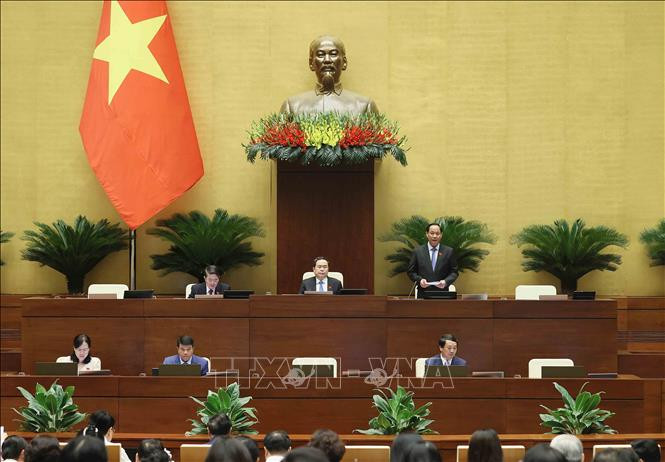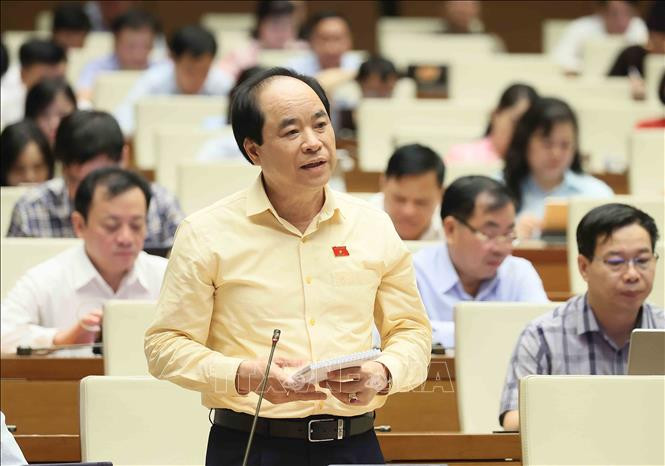On the morning of June 17, the National Assembly discussed in the hall the adjustment of investment policy for the National Target Program on Socio-Economic Development in Ethnic Minority and Mountainous Areas for the 2021-2030 period.

According to delegate Nguyen Thi Lan Anh (Lao Cai), the education and training of students and workers in ethnic minority areas has always received attention from the Party and State, which have issued and implemented many policies on training, including the National Target Program on Socio-Economic Development in Ethnic Minority and Mountainous Areas for the 2021-2030 period.
Delegates said that the Program has had a positive impact on the lives of people and ethnic minorities, especially in mountainous border provinces, but in practice, the implementation of the Target Program still has some problems.
Currently, secondary schools, colleges, vocational training centers, vocational and continuing education centers, vocational and continuing education centers of districts in provinces in ethnic minority and mountainous areas have the function of organizing training at college level, intermediate level, elementary level and continuing education according to regulations. Up to 80% of students at these facilities are ethnic minorities.
Studying at the province’s educational institutions helps them travel conveniently, reducing the economic burden when these students are all from poor and near-poor households, thus helping to reduce the dropout rate, effectively implementing the stream of students after junior high school while still ensuring the improvement of the quality of vocational education for workers in ethnic minority areas. In addition, these students are very important local resources, contributing greatly to the economic development of the locality.
However, currently, vocational training institutions in ethnic minority and mountainous areas are still lacking in facilities and training equipment. Local budgets are still difficult and are mostly received from the central government. Therefore, investment sources for education and training are limited and have not met the needs. While these educational institutions are also the subjects of sub-project 3 of project 5 under the Target Program for Socio-economic Development in Ethnic Minorities and Mountainous Areas, because the locations of these training institutions are not in ethnic minority areas, they are not beneficiaries of the program's policies. For the above reasons, delegates from Lao Cai province hope that the Government will add this subject to the list to create conditions for localities to implement the goals and tasks of the program.

Giving his opinion at the discussion session, delegate Truong Xuan Cu (Hanoi) also expressed his interest in education work in ethnic minority and mountainous areas. Delegate Truong Xuan Cu stated: Conclusion 65 dated October 30, 2019 of the Politburo on ethnic work in the new situation affirmed that improving the quality and expanding the system of boarding and semi-boarding schools for ethnic minorities is extremely necessary.
The delegate affirmed that the goal of our Party in education is to improve people's knowledge, train human resources and nurture talents. Over the past years, we have done very well, especially with many preferential policies for the education system in ethnic minority and mountainous areas, with the motto of considering education and training as the top national policy through specialized school systems, ethnic boarding and semi-boarding schools.
"However, I see that the issue of nurturing talents for the ethnic boarding school system and for ethnic boarding students is still a concern. In the current specialized school system nationwide and in universities, the percentage of ethnic minorities is very small, very low. If there are no separate schools, it will certainly be difficult," said delegate Truong Xuan Cu.
Delegate Truong Xuan Cu said that the system of ethnic boarding schools and specialized schools in the province must take the specialized high school system for ethnic minority students.
"I think that would be reasonable, because the province's general specialized schools only have a few ethnic minority students. The province's boarding schools for ethnic minorities only have students who are talented in foreign languages, literature, arts, and specialized subjects so that we can train them properly," the delegate said.
According to the delegate, the current district-level ethnic boarding schools should only provide high school education: "The general population should be sent to district-level boarding schools and the commune-level boarding schools are for primary and secondary school. With a system from the commune up, from school clusters up, then the specialized boarding schools will certainly be able to select students with qualities and talents for us to integrate. If the whole country integrates internationally, then the efforts of ethnic minorities to integrate into the country are also very good, we must start with education", the delegate emphasized.
To invest in education for gifted students, delegates proposed using budget funds or training "contracts" with universities, such as specialized schools of the National University, specialized schools of Hanoi Pedagogical University and all other specialized schools.
"We have long had recruitment and other forms of funding for education. Now, in my opinion, we need to focus on ethnic minority talents to be able to integrate," said delegate Truong Xuan Cu. At the same time, the delegate also proposed a policy of sending qualified individuals and excellent ethnic minority students to study in countries that share borders with localities of neighboring countries to create human resources to contribute to the goal of international integration in border provinces.